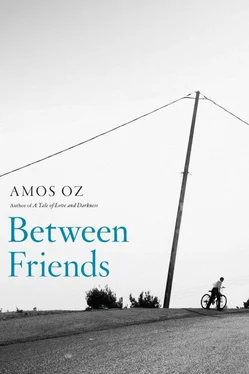They went out, leaving Roni alone in the apartment. He lit a cigarette and stood at the window, his back to the room, his face to the darkness outside. Leah returned at nine and didn’t say a word to him. She sat down on her wicker armchair, smoked, and read her education magazine. At ten, Roni said, “I’m going out for a walk. To see how he is.”
Leah said quietly, “You’re not going anywhere.”
Roni hesitated, then gave in because he no longer trusted himself.
At ten thirty they turned off the radio, emptied the ashtray, opened the sofa, and made up the double bed. They lay under their separate blankets because tomorrow they had to get up for work before six again. Outside, the rain had resumed and the wind blew the stubborn ficus tree branch against the shutters. Roni lay on his back for a while, his open eyes staring at the ceiling. For a moment, he imagined that he heard a faint whistling in the darkness. He sat up in bed and listened hard, but he could hear only rain and wind and the branch brushing against the shutters. Then he fell asleep.
IN FEBRUARY, IT WAS Yoav Carni’s turn to be night guard for a week, from Saturday to Friday. He had been Kibbutz Yekhat’s first baby, and the founders, including his parents, were very proud when, years later, he was elected to be secretary, the first person to hold that post who was actually born on the kibbutz. Most of his friends were tanned, muscular, and sturdy, while Yoav was gangly and slightly stooped, pale and big-eared, carelessly shaved, absent-minded, and contemplative. He looked like a Talmudic scholar. His head always jutted forward as if he were examining the path before him, his gaze usually fixed beyond the shoulder of the person he was speaking to. He managed kibbutz matters with delicacy and tact. He never raised his voice or banged on the table, but the members knew that he was honest, quietly persistent, and good-natured. He, for his part, was almost ashamed of his good nature and always tried to appear scrupulous, strict, and zealously adherent to kibbutz principles. If you asked him for an easier job or fewer work hours, he would answer gravely that such things were absolutely out of the question here and that we must always abide by our principles. But he would immediately begin a discreet search for a loophole, a way around the rules, in order to help you.
A few minutes before eleven at night, Yoav pulled on his boots and dressed warmly in his heavy, worn-out army jacket and a wool hat that covered his ears; then he went to the duty night guard, Zvi Provizor, to take over the rifle. Zvi, the gardener, said sadly to the secretary, “Did you hear, Yoav? Minnesota is having its worst snowstorm in forty years. Eighteen dead and ten missing so far.”
Yoav said, “I’m sorry to hear it.”
Zvi added, “There are floods in Bangladesh, too. And Rabbi Coopermintz died suddenly an hour or two ago in Jerusalem. They just announced it on the radio.”
Yoav reached out to pat Zvi on the shoulder but withdrew his hand when he recalled that Zvi didn’t like to be touched. So he smiled at him, instead, and said affectionately, “If you should happen to hear one piece of good news, come and tell me right away. Even in the middle of the night.”
Yoav left, and when he passed the fountain that Zvi Provizor had installed in the square in front of the dining hall, he thought that a lonely, aging bachelor had a harder time here than he would in other places because kibbutz society offered no remedies for loneliness. In fact, the very idea of a kibbutz denied the concept of loneliness.
Now that he had taken the gun from Zvi, Yoav made his first round of the kibbutz grounds. As he walked past the old-timers’ houses, he switched off lights that were burning needlessly here and there and turned off a sprinkler someone had forgotten before going to bed. He picked up an empty sack that had been tossed near the barber’s shed, folded it carefully, and left it at the door of the produce barn.
Lights still shone in some windows, but soon the kibbutz would be shrouded in sleep, and only he and the night guard in the children’s house would stay awake till morning. A cold wind was blowing and the pine needles whispered in reply. A faint lowing came from the cow barn. In the darkness, he made out the rows of buildings where the old-timers lived, four two-room apartments in each building, all furnished with plywood furniture, plants, floor mats, and cotton curtains. At one o’clock he had to go to the brooder house to check the temperature, and at three thirty he had to wake the dairy workers for the predawn milking. The night would pass quickly.
Yoav enjoyed these night shifts, far removed from the daily routine full of committee discussions and members’ complaints and requests. Sometimes people much older than he would come to pour out their hearts to him, and there were all sorts of delicate social problems requiring discreet solutions, or budget concerns, relationships with outside organizations, and kibbutz representation in the various institutions of the movement. Now, at night, he could wander alone among the lean-tos and chicken coops, stroll along the length of the fence illuminated by yellow lights, sit for a while on an upturned crate near the metalwork shop, and sink into night thoughts. His night thoughts revolved around his wife, Dana, now lying in the dark, listening drowsily to the radio in the hope that it would lull her to sleep; his mind also turned to their twins, now sleeping in their beds in the children’s house. In an hour he’d stop in there and cover them. Maybe he’d also drop by his house and turn off the radio, which Dana usually neglected to do before she fell asleep. Dana didn’t like living on the kibbutz and dreamed of a private life. She’d begged him to leave many times. But Yoav was a man of principle who fought constantly to improve kibbutz life and he wouldn’t hear about leaving. Nonetheless, he knew in his heart that kibbutz life was fundamentally unjust to women, forcing them almost without exception into service jobs like cooking, cleaning, taking care of children, doing laundry, sewing, and ironing. The women here were supposed to enjoy total equality, but they were treated equally only if they acted and looked like men: they were forbidden to use makeup and had to avoid all signs of femininity. Yoav had thought about that injustice many times, had tried to come to a conclusion about it, find a remedy, but could not. Perhaps that was why he always saw himself as the guilty party in his relationship with Dana and felt constantly apologetic.
The night was cold and clear. The croaking of frogs punctuated the silence and a dog barked somewhere far off. When Yoav looked up, he saw a mass of low clouds gathering above his head and said to himself that all the things we think are important really aren’t, and he had no time to think about the things that really are. His whole life was going by and he had never contemplated the big, simple truths: loneliness and longing, desire and death. The silence was deep and wide, broken occasionally by the cries of jackals, and Yoav was filled with gratitude both for that silence and for the cries of the jackals. He didn’t believe in God, but in moments of solitude and silence such as this, Yoav felt that someone was waiting for him day and night, waiting silently and patiently, soundlessly and utterly still, and would wait for him always.
As he walked slowly between the cold-storage room and the fertilizer shed, the rifle slung over his shoulder, he saw a thin silhouette between the shadows of the walls and suddenly a figure wearing a coat blocked his path. A woman’s voice, deep, pleasant, slightly husky, said, “Don’t be frightened, Yoav. It’s just me. Nina. I’ve been waiting for you to pass by here. I knew you would. I have to ask you something.”
Читать дальше












